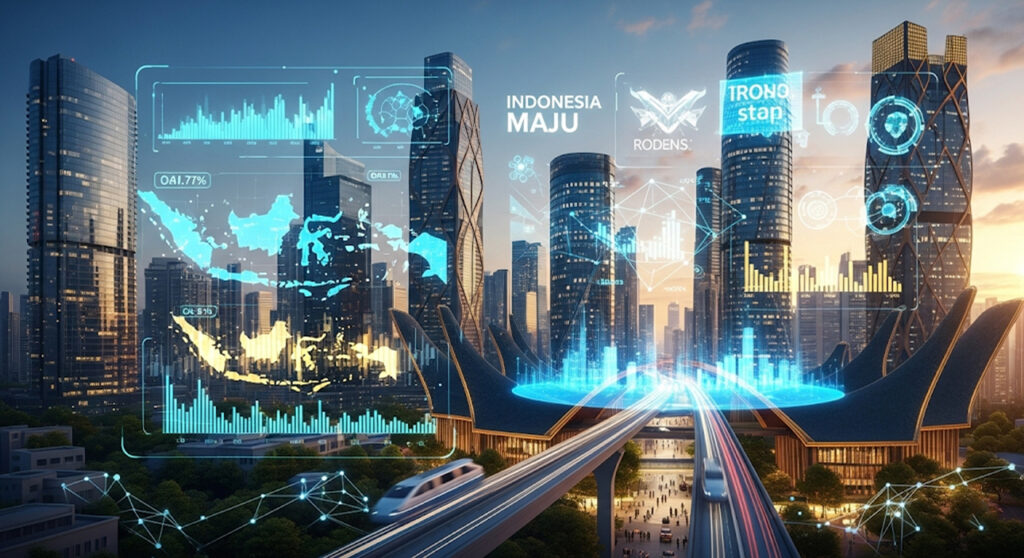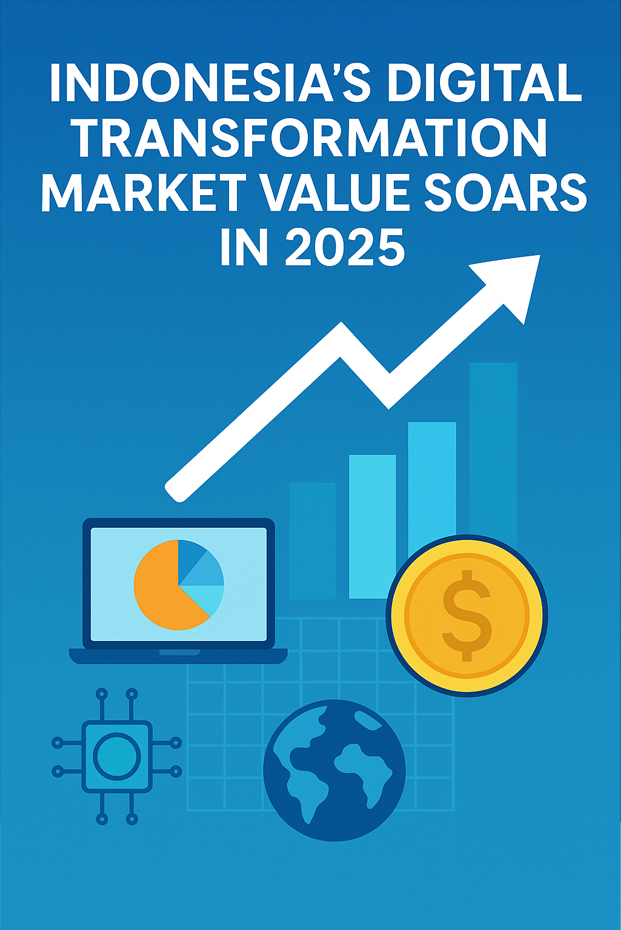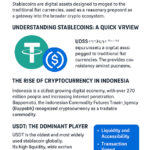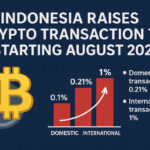Premium Biz Post – The technology landscape in Southeast Asia is rapidly evolving, and Indonesia has emerged as a central hub for digital innovation and economic growth. As the country continues to invest heavily in digital infrastructure, automation, and advanced technologies, Indonesia’s digital transformation market value soars in 2025, signaling a pivotal moment in its journey toward becoming a leading player in the global digital economy.

Understanding Digital Transformation in Indonesia
Digital transformation involves the integration of digital technologies into every facet of business operations, government systems, and society at large. This shift goes beyond simply adopting technology; it represents a complete cultural and operational change that enables organizations to deliver better services, create new business models, and meet the demands of increasingly tech-savvy consumers.
In Indonesia, digital transformation is driven by several factors, including:
- Rapid internet penetration, with over 77% of the population online.
- A large, young, and tech-savvy demographic eager to embrace digital solutions.
- Government support through initiatives like “Making Indonesia 4.0” and the National Digital Transformation Roadmap 2021–2024.
- Growing investment in cloud computing, artificial intelligence (AI), Internet of Things (IoT), and fintech innovation.
These factors are propelling Indonesia’s position as one of the fastest-growing digital markets in Asia.
Market Size and Growth Projections
In 2025, Indonesia’s digital transformation market is valued at approximately USD 24.37 billion, a remarkable increase compared to previous years. Analysts project a compound annual growth rate (CAGR) of around 19.44%, meaning the market could potentially reach USD 59.23 billion by 2030.
This surge is supported by a growing digital economy, which contributed an estimated 7–8% of Indonesia’s GDP in 2024. With initiatives from both the private and public sectors, digital adoption is no longer optional; it has become a necessity for businesses of all sizes to remain competitive.
Government Policies Driving Transformation
Indonesia’s government has been proactive in accelerating digital adoption. The National Digital Transformation Roadmap focuses on strengthening infrastructure, building talent capacity, and promoting innovation. Key government initiatives include:
- Digital Indonesia Framework: Aims to improve internet access, cloud infrastructure, and cybersecurity.
- Smart City Programs: Implemented in over 100 cities to enhance public services using IoT and AI technologies.
- Digital Skills Training: The government targets training over 9 million Indonesians in digital skills by 2030.
- E-Government Systems: Increasing investment in digital public services to improve efficiency and transparency.
These initiatives align with Indonesia’s goal to become Southeast Asia’s digital powerhouse and ensure that its digital economy remains globally competitive.
The Role of Private Sector Investment
Private enterprises are playing a crucial role in fueling this transformation. Multinational corporations and local startups alike are pouring billions into sectors such as e-commerce, fintech, cloud services, and AI development.
Some of the most notable trends include:
- E-Commerce Boom: Indonesia is Southeast Asia’s largest e-commerce market, with platforms like Tokopedia, Shopee, and Lazada leading the charge.
- Fintech Innovation: Startups offering payment gateways, digital lending, and mobile banking services are expanding rapidly.
- Cloud and Data Centers: Companies like Google, Amazon Web Services, and Microsoft have invested heavily in cloud infrastructure, improving access to advanced computing resources.
- AI and IoT Adoption: Manufacturing, logistics, and retail sectors are increasingly implementing AI-driven analytics and IoT solutions to improve efficiency.
Private investment ensures that Indonesia’s digital ecosystem is not only growing but also evolving with cutting-edge technologies.
Emerging Sectors Leading the Transformation
- E-Commerce
Indonesia’s e-commerce industry is expected to exceed USD 120 billion by 2030, fueled by rising smartphone penetration, affordable internet packages, and innovative logistics solutions. - Fintech
With 51% of Indonesia’s population unbanked or underbanked, fintech solutions are bridging financial gaps, offering digital payments, microloans, and investment products. - HealthTech
Telemedicine platforms and health monitoring apps surged in popularity during the COVID-19 pandemic and remain essential as healthcare providers embrace digitalization. - EdTech
The education sector has seen tremendous innovation, with online learning platforms making education more accessible, especially in rural regions. - Smart Manufacturing
Through the “Making Indonesia 4.0” initiative, local industries are adopting automation, robotics, and AI to increase productivity and reduce costs.
Read More : ”Simple yet Captivating Handicrafts: Personal Touch of Creation”
Indonesia’s Position in the Regional and Global Landscape
Indonesia’s vast population of over 270 million gives it a strategic advantage in Southeast Asia. With digital transformation accelerating across sectors, the country is well-positioned to become a regional hub for innovation and technology investment.
Neighboring countries like Singapore and Malaysia have advanced digital infrastructure, but Indonesia’s large domestic market offers unparalleled opportunities for growth. Tech giants see Indonesia as a key market, resulting in partnerships, investments, and talent development programs.
Globally, Indonesia’s digital economy is catching the attention of investors, with the country ranked among the top five emerging markets for digital adoption and transformation.
Challenges Facing Digital Transformation
Despite impressive growth, Indonesia faces several challenges in sustaining its digital transformation momentum:
- Digital Divide: Rural areas still struggle with limited internet access, creating inequality in digital participation.
- Cybersecurity Risks: As businesses digitize, cybersecurity threats become more sophisticated, demanding stronger defenses.
- Talent Shortages: While progress has been made, there remains a shortage of highly skilled professionals in fields like AI, cybersecurity, and software engineering.
- Regulatory Uncertainty: Rapid changes in policies and regulations can slow down innovation and deter investment.
Addressing these challenges will require collaboration between government agencies, private companies, and educational institutions.
The Future of Indonesia’s Digital Economy
Analysts believe that Indonesia’s digital economy could contribute up to USD 130 billion annually by 2030 if digital adoption continues at the current pace. The combination of favorable demographics, innovation-driven startups, and government support makes Indonesia one of the most promising digital markets in the world.
As Indonesia transitions into a digital-first nation, we can expect more initiatives in areas such as green technology, 5G infrastructure, blockchain, and AI-driven solutions. These technologies will not only benefit businesses but also enhance quality of life for millions of citizens.
Why Businesses Should Invest in Indonesia’s Digital Market
For global investors and entrepreneurs, Indonesia’s booming digital sector presents lucrative opportunities:
- Large Consumer Base: With over 200 million internet users, the country is a goldmine for digital services.
- Innovation Ecosystem: Indonesia’s startup ecosystem ranks among the top in Asia, with increasing venture capital support.
- Government Backing: Supportive policies and incentives encourage foreign investment in technology sectors.
- Untapped Potential: Many sectors, particularly rural areas and traditional industries, remain under-digitized, leaving room for disruption.
By strategically investing in this growing market, companies can secure a strong foothold in Southeast Asia’s future digital economy.
Indonesia’s digital transformation is no longer a vision; it is a reality reshaping industries, businesses, and daily life. With its digital transformation market valued at USD 24.37 billion in 2025 and projected to hit USD 59.23 billion by 2030, the country’s growth trajectory is undeniable.
Both government initiatives and private sector investments are fueling this shift, creating a robust ecosystem for innovation. While challenges like talent shortages and cybersecurity threats remain, Indonesia’s position as Southeast Asia’s largest economy ensures its role as a leader in the global digital economy.
For businesses and investors, now is the perfect time to capitalize on this momentum and participate in Indonesia’s digital revolution.



